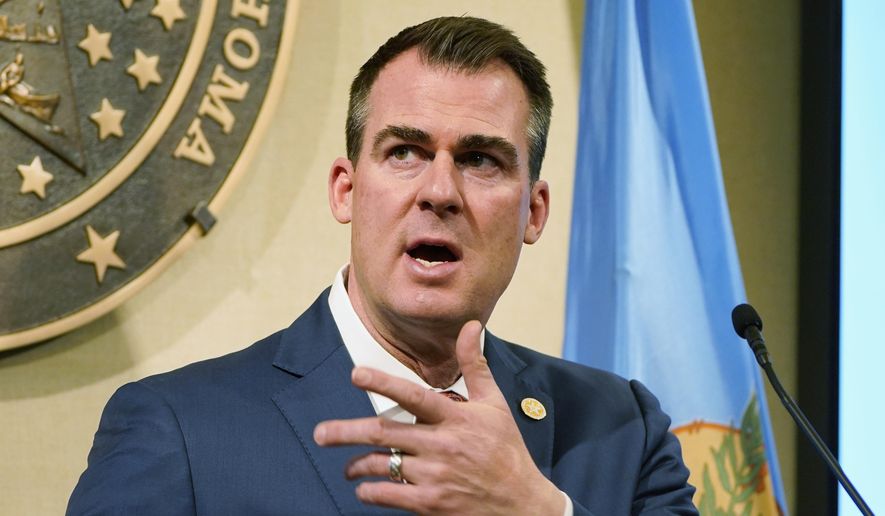OKLAHOMA CITY (AP) - As the coronavirus swept across Oklahoma and the nation last spring, Gov. Kevin Stitt’s office was inundated with correspondence from frightened residents seeking stricter lockdowns to control the spread of the virus.
“We can bring back lost jobs. We can re-strengthen the economy. We cannot, however, regain the lives of those we have already lost and will continue to lose if we fail to get this right,” Tulsa resident Nate Morris wrote in an April 2020 letter to Stitt signed by 1,200 people.
At the same time, the governor was also weighing requests from dozens of business leaders asking him to make sure their businesses stayed open. The Associated Press reviewed nearly 9,000 documents released by the governor’s office in response to an open records request that show the delicate balance Stitt and his team tried to walk during the early stages of the pandemic.
Real estate agents, banks, manufacturers and firearms distributors were among those who asked the governor to make sure their businesses stayed open. Even a filmmaker seeking to shoot a movie in Oklahoma reached out to the governor to make sure the state’s COVID restrictions wouldn’t disrupt the production.
“We look forward to shooting the Reagan film in your state,” producer Mark Joseph wrote in a March 8 letter to Stitt. “Our start date is May 11 but I’d like to talk to you about what measures can be taken to assure that we don’t experience any delays because of the coronavirus.”
Production of the film ultimately was halted temporarily after multiple people on the set tested positive for COVID-19.
The AP specifically sought communications between the governor’s office, state health officials, cities, counties, medical groups and business and industry organizations to gauge how Stitt’s office developed policies in response to the coronavirus pandemic. In response, Stitt’s office provided the AP with about 9,000 documents that included everything from generic emails from hotel chains to correspondence with a state lawmaker about setting up a photo shoot with his granddaughter.
Included in the documents was correspondence between Sean Kouplen, Stitt’s secretary of workforce development, and Elon Musk, the billionaire owner of Tesla, as part of Oklahoma’s longshot bid to lure the company’s new manufacturing facility to Tulsa.
In response to a June 2020 request by Kouplen to arrange a meeting between Musk and the governor, Musk responded: “Out of respect, sure. The fundamental problem I have is getting people to move out of California. Austin (Texas) is one of the few places to which they will move.”
The company ultimately picked Austin as the site for its new facility.
The governor’s then-deputy general counsel, Grayson Walker, also withheld 41 pages of documents under two exceptions in the state’s Open Records Act. One allows withholding information detailing the prospective location of a private business and another allows governors to withhold information they receive from “senior executive branch officials while deliberating discretionary decisions and shaping policy.”
Ultimately, Stitt made reopening the state’s economy a priority, allowing businesses to open despite warnings from health officials that he was moving too quickly. He also failed to impose a statewide mask mandate, despite pleas from medical groups that he do so.
Stitt defended his decision last week, saying “it is clear that Oklahoma took the right approach.”
“We were the first state to fully reopen on June 1 of last year, which put 100,000 more Oklahomans to work,” Stitt said. “Now we have the lowest unemployment in the region and we have a budget surplus of $1.6 billion.”
Still, more than 7,300 Oklahomans have lost their lives to COVID-19, and Oklahoma’s death rate per capita is more than double that of Oregon, a state of comparable size that imposed stricter coronavirus lockdown measures.
Senate Democratic Leader Sen. Kay Floyd, who twice wrote to Stitt urging stronger business lockdowns and a mask mandate, said she disagreed with the governor’s characterization that his office made the right decisions.
“The first test we should look at is how many lives did we save and how many did we lose,” said Floyd, D-Oklahoma City. “That should be the most important stat we look at, and we didn’t do well. I do not consider that a success.”




Please read our comment policy before commenting.